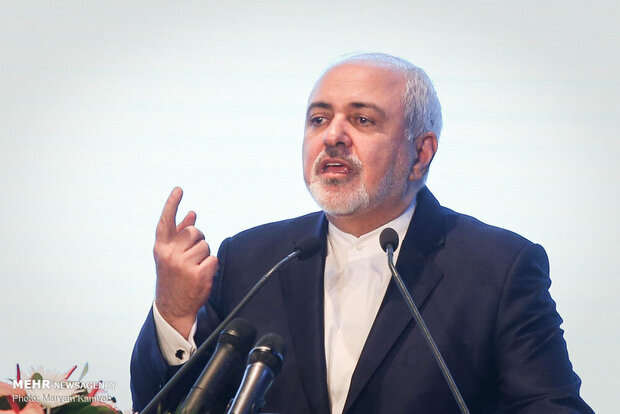TEHRAN — Foreign Minister Mohammad Javad Zarif has said the U.S. sanctions on Iran and its assassination of Lieutenant General Qassem Soleimani will not demoralize the Iranian nation, Mehr reported.
“The U.S. policy has brought nothing but disgrace to that country,” Zarif said in a video conference held late on Saturday to mark a deadly chemical attack by former Iraqi dictator Saddam Hussein on the Iranian city of Sardasht in West Azarbaijan Province in 1987.
He said the U.S. has failed to observe any human rights principles, either by providing chemical weapons to Iraq against Iran in the 1980s or imposing sanctions and pursuing economic terrorism against the Iranian people.
The U.S. government is continuing this path amid the global fight against the coronavirus which has affected the entire world, he said.
Zarif added that the U.S. is creating obstacles in the way of supplying medicine to Iran through its “inhumane sanctions”.
Zarif says the Islamic Republic has not forgotten and will never forget the support and complicity of the U.S. and Europe in the horrible chemical attack by Saddam on Sardasht 33 years ago.However, he said, as the Islamic Republic managed to stand against Iraq’s chemical weapons, it has also succeeded in fighting the virus despite all sanctions.
“The Iranian people have truly witnessed such moves during the [Iraq’s] imposed war, and the economic war, economic terrorism and state terrorism of the United States of America,” the foreign minister noted.
Zarif also said the Islamic Republic has not forgotten and will never forget the support and complicity of the U.S. and Europe in the horrible chemical attack by Saddam on Sardasht 33 years ago.
‘Sardasht was peak of Saddam regime’s brutality’
“[The] Sardasht [chemical attack] was the peak of the Saddam regime’s brutality,” he said. “Sardasht was a symbol of the brutality of individuals who recognize no boundaries to reaching their goal and resort to various inhumane methods to reach their goal.”
He also lashed out against the UN Security Council for its silence during Saddam’s crimes against the Iranian people.
“Iraq used chemical weapons against Iran several times and Tehran reported it to the United Nations and the Security Council,” he explained, adding that while the UN reports showed that Iraq had used chemical weapons against Iran, the UN Security Council did not condemn the heinous crime.
June 28 is the National Day of Campaign against Use of Chemical and Microbiological Weapons in Iran. It marks the anniversary of the dastardly chemical attacks on the northwestern Iranian city of Sardasht by the Saddam regime in June 1987.
On this day, Iraqi aircraft dropped mustard gas bombs on Sardasht in two separate bombing runs on four residential areas. The number of victims was initially estimated as 10 civilians dead and 650 civilians injured.
Iraq frequently used chemical weapons against Iranian civilians and soldiers during the war.
The U.S., the UK, Germany, Italy, and Holland were among the countries that provided Saddam Hussein’s Ba’athist Iraq with the equipment and material to build chemical weapons.
Iraq made the most of its acquisitions by launching over 350 large-scale chemical attacks along the Iran-Iraq border between 1980 and 1988 on soldiers and civilians alike, using mustard gas, and the nerve agents VX, Tabun, and Sarin.
TAGS


No comments:
Post a Comment